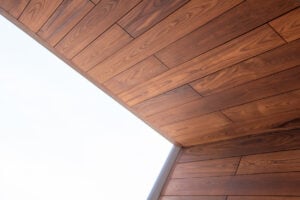Thermally Modified Ash
Sustainable and Durable Thermally Modified Ash for Modern Construction
Thermally Modified Ash is crafted following the highest standards of social and environmental responsibility, proudly holding 100% FSC® certification. This recognition is a testament to our commitment to sustainability and ethical forestry practices.

The process of heat treating Thermally Modified Ash not only enhances its stability but also increases its durability, making it an exceptional choice for a wide range of projects. This thermal enhancement process involves carefully controlled heating that strengthens the wood, enhancing its natural properties without the use of chemicals.
Extended Lifespan
Thermally Modified Ash is renowned for its longevity, boasting a lifespan of over 25 years. This durability is attributed to the superior quality of the woods used, which are selected for their natural resilience and treated to withstand the tests of time, all while being chemical-free.
Versatility in Use
The versatility of Thermally Modified Ash makes it suitable for various applications, both aesthetic and structural. It is an excellent material for outdoor decking, as well as for interior and exterior paneling. Its robustness also makes it ideal for heavy-duty uses such as industrial flooring, heavy carpentry, and more. Additionally, its unique characteristics are perfect for creating beautiful furniture components and moldings.
Distinctive Aesthetic Appeal
One of the most striking features of Thermally Modified Ash is its distinctive aesthetic appeal. The wood naturally exhibits wave-like patterns that add texture and visual interest to any project. This beautifully textured finish is not only pleasing to the eye but also tactilely engaging.
Elegant Dark Finish
The thermal treatment process also imparts a smooth, dark finish to the wood. This darker shade is achieved through the caramelization of lignin, a natural process that occurs when the wood’s hemicellulose is transformed under heat. This results in a rich, deep color that enhances the wood’s natural beauty.
In summary, Thermally Modified Ash is not only a sustainable choice but also a practical one for modern construction projects, offering both aesthetic beauty and long-lasting durability. Whether you’re planning an outdoor deck or sophisticated interior furnishings, Thermally Modified Ash provides a reliable and attractive solution.
Exploring the Benefits of Thermally Modified Wood
Thermally modified wood, as the name suggests, is natural wood that has undergone a special drying process. This method enhances the wood, making it a prime choice for exterior applications like decking and siding. Unlike tropical hardwoods or other naturally rot-resistant species, thermally modified wood uses more accessible and economical FSC-certified hardwoods and softwoods such as Ash, Oak, Iroko, or Pine.
By heating these woods to high temperatures in a controlled environment, their cellular structure is altered, resulting in a product that is dimensionally stable and resistant to decay and pests. Despite these changes, the wood retains its workability and adopts a rich, golden brown hue, maintaining its original species characteristics but without the typical seasonal movement issues. This makes it an ideal material that repels water and is unappealing to insects.
The technique of thermal modification is not new; it traces back thousands of years to the Vikings and was also used by Japanese woodworkers. The modern process, however, was perfected in the 1970s with the ThermoWood method, setting a high standard for quality and consistency in the treatment process. Thermally modified wood is especially suited for harsh environments, such as oceanfront locations or areas exposed to intense sun.
Thermally modified lumber is durable enough for use in ground-contact applications or in direct contact with water, making it perfect for docks and poolside decks. Its ability to withstand the elements makes it a robust option for outdoor use, and it can either be left to weather naturally to a silvery gray or finished to preserve its original color.
Characteristics of Thermally Modified Ash
If you’re familiar with White Ash, you’ll find thermally modified Ash similar in workability but with enhanced hardness and less density due to the treatment process. The most noticeable difference is its darker color, though it can also fade to a silvery gray or be maintained with regular finishing to keep its baked hue.
Here are some key properties of Thermally Modified Ash:
| Property | Value | Change |
|———————-|——————-|——————|
| Bending Strength | 1,722,600 lbf/in2 | Decrease of 1% |
| Stiffness | 12,000 lbf/in2 | Decrease of 20% |
| Hardness (Janka) | 1325 lbf | Increase of 1% |
| Specific Gravity | 0.55 | No change |
| Weight | 33.6 lbs/ft3 | Decrease of 20% |
| Density | 554 kg/m3 | Decrease of 12% |
| Radial Shrinkage | 0.1% | Decrease of 2% |
| Tangential Shrinkage | 0.4% | Decrease of 5% |
Interested in learning more or obtaining samples of Thermally Modified Ash? Click here to request a sample and discover how this innovative material can enhance your next project.
